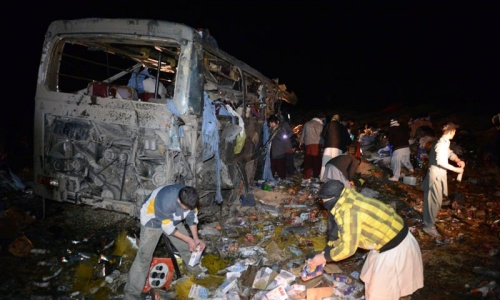ISLAMABAD: Sectarian killings rose by more than a fifth in Pakistan last year, a leading rights group said Thursday, warning of an alarming increase in violence against religious minorities.
The independent Human Rights Commission of Pakistan (HRCP) said 687 people were killed in more than 200 sectarian attacks last year, a rise of 22 per cent on 2012.
The group warned that ongoing peace talks between the government of Prime Minister Nawaz Sharif and the hardline militants of the Pakistani Taliban could make minorities even more vulnerable.
Around 97 per cent of Pakistan's 180 million population is Muslim, the vast majority Sunnis.
Violence against Shia Muslims, who make up around 20 per cent, has been growing in recent years, much of it led by extremist sectarian groups such as Lashkar-i-Jhangvi (LJ).
Also read: Sectarian violence increased in 2013, says report
The country's small Christian, Hindu and Ahmadi communities also suffer discrimination and occasional outbursts of violence.
At the launch of the HRCP's annual report on Pakistan's rights situation, secretary general I. A. Rehman said minorities were facing increasing violence.
“Minorities in Pakistan are increasingly feeling insecure since the present government came to power in June last year,” he told reporters.
Peace talks with the Thereek-i-Taliban Pakistan (TTP) could have “immense repercussions” on religious minorities, he warned.
The TTP, whose seven-year insurgency has claimed thousands of lives, want to impose strict sharia law across Pakistan.
“It is a choice of the government if it wants to have negotiations with the Pakistani Taliban but these negotiations should not come at the cost of religious minorities and women,” said Rehman.
Nearly 200 Shia were killed in the first seven weeks of 2013, most in two huge bombings in the southwestern city of Quetta, a flashpoint for sectarian violence.
The rights group said that since the present government came to power the trend had shifted from large-scale attacks to individual killings targeting Shiite doctors, lawyers and intellectuals.
The report also called 2013 “one of the darkest years” for Christians in Pakistan, with the deadliest ever attack on the community mounted in the northwestern city of Peshawar in September.
Nearly 100 worshippers were killed when two suicide bombers blew themselves up at All Saints Church after a Sunday service.















































